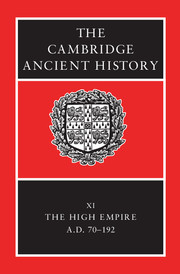Book contents
- Frontmatter
- PART I NARRATIVE
- PART II GOVERNMENT AND CIVIL ADMINISTRATION
- 4 The emperor and his advisers
- 5 Emperor, Senate and magistrates
- 6 The growth of administrative posts
- 7 Provincial administration and finance
- PART III THE EMPIRE
- PART IV ROME, ITALY AND THE PROVINCES
- PART Va ECONOMY AND SOCIETY
- PART Vb ART AND CULTURE
- Chronological Table
- BIBLIOGRAPHY
- Index
- 1 The Roman world in the time of Marcus Aurelius
- 7 The Danube provinces
- References
4 - The emperor and his advisers
from PART II - GOVERNMENT AND CIVIL ADMINISTRATION
Published online by Cambridge University Press: 28 March 2008
- Frontmatter
- PART I NARRATIVE
- PART II GOVERNMENT AND CIVIL ADMINISTRATION
- 4 The emperor and his advisers
- 5 Emperor, Senate and magistrates
- 6 The growth of administrative posts
- 7 Provincial administration and finance
- PART III THE EMPIRE
- PART IV ROME, ITALY AND THE PROVINCES
- PART Va ECONOMY AND SOCIETY
- PART Vb ART AND CULTURE
- Chronological Table
- BIBLIOGRAPHY
- Index
- 1 The Roman world in the time of Marcus Aurelius
- 7 The Danube provinces
- References
Summary
The bulk of our sources, whether historiographic, juristic or epigraphic, give the impression that the Roman emperor was all-powerful and always busy. Yet this picture of a ruler who was always personally active is only a very superficial and hence a partly misleading one. In reality the emperor relied on others in almost all aspects of his decision-making and actions. He needed advice and was dependent on his advisers; indeed he could not operate without them. Despite his omnipotence, this was evident to all who knew something of the emperor's work.
The sources give a generally accurate impression of imperial business because the emperor is always the central figure in them. He appears as the focal point of consultations and decisions. Even the way in which decisions were reached is dependent on the person of the emperor in each of his specific guises: he is the dominating point of reference for policy-making and central administration. In this respect the orientation of the works of Tacitus and Suetonius, while quite different in composition, and their emphasis on the individual emperors, are entirely appropriate to the matters they relate.
At the same time, however, the far-reaching dependence of imperial policy and government on the person of the ruler implies that, in essence, anyone who came into contact with the emperor could influence his decisions. How far this influence might go naturally depended to a great extent on the emperor's character, but equally on those who wanted to induce him towards certain courses of action.
- Type
- Chapter
- Information
- The Cambridge Ancient History , pp. 195 - 213Publisher: Cambridge University PressPrint publication year: 2000
References
- 41
- Cited by

